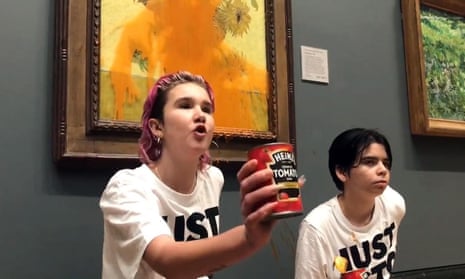In the midst of a worsening environmental disaster, protests matter more than ever.
Last week, two Just Stop Oil activists threw tomato soup at Vincent van Gogh’s Sunflowers painting in London as part of a broader push for the cessation of new fossil fuel projects – something the Intergovernmental Panel on Climate Change describes as crucial to prevent climate disaster.
The Sunflowers painting, safe behind a perspex sheet, remained entirely unharmed and went back on display the same day.
The stunt followed other art protests, in which activists glued themselves to artworks by Botticelli, Boccioni, Van Gogh and other old masters. In Melbourne, Extinction Rebellion campaigners targeted the Picasso painting Massacre in Korea.
No one has been injured. No art has been damaged. Yet conservatives everywhere have lost their collective minds.
To take a fairly random example, as far back as July, News Corp’s Dan Petrie was tut-tutting in the Courier Mail about activists alienating their own supporters, explaining that gallery protests would increase insurance premiums and so drive up the prices of tickets to exhibitions.
Gosh, wait until he hears about what climate change will do!

Dan Petrie’s tactical advice might, of course, be more compelling had every other strategy employed by the environmental movement not also being ridiculed by News Corp columnists.
In 2019, for instance, the same Courier Mail published mugshots of Extinction Rebellion supporters under the headline: “Faces of Brisbane’s serial climate activists revealed.” Those protesters hadn’t targeted any art, but the paper still blamed them for “bring[ing] misery” with “their disruptive tactics”.
When school students organised for an entirely peaceful climate strike, the Daily Telegraph’s Tim Blair declared they would have “benefited from ridicule”, contrasting them unfavourably with the far-right activist (and domestic abuser) Avi Yemini.
In the Australian newspaper, Kevin Donnelly complained that “ideology and emotion is replacing reason and objectivity”, since the youthful strikers are, he said, “deeply imbued with cultural left ideology and the politics of liberation, self-emancipation and establishing a new world order”.
Clearly, then, street protests of all sorts are Very Bad Indeed. What about an eminently moderate group of adults taking a climate message to Australia’s federal parliament?
That’s even worse.
In May, the Australian’s Greg Sheridan dubbed the teals, with their “extremist position on climate change”, as “destructive and dangerous” – “a direct threat to our national security, no less”.
In his column on the Van Gogh stunt, Andrew Bolt gave the game away. After the usual abuse of climate activists (“barbarians”, “their only love seems a love of power”, yadda yadda yadda), Bolt said that “global warming … has actually helped us grow record crops, because carbon dioxide is a plant food”.
In other words, he not only doesn’t like Just Stop Oil because of their tactics but because of their goals.
They want to prevent climate change. Bolt doesn’t.
In a previous column, I noted how, as environmental disasters intensify, governments everywhere are introducing draconian anti-protest laws. The overt repression has been accompanied by the ideological demonisation of demonstrations of every kind.
That’s why it’s wrong to obsess about what we might call the Goldilocks protest. We cannot devise a “just right” action that will somehow satisfy the apologists for the status quo.
On the contrary, the more effectively we mobilise against fossil fuels, the more hysterical they’ll become.
Which isn’t to say that strategy doesn’t matter.
In these columns, and in a recent book, I’ve argued for a grassroots orientation, based on mobilising and empowering the ordinary men and women who suffer most from climate change.
By contrast, stunts by small groups or individuals reinforce a sense of working people as a passive constituency dependent on others to protest for them. That’s why mass, collective actions are preferable to stunts directed largely at the media.
Of course, every social movement in history harbours differences – and every movement makes mistakes.
With the environmental catastrophe accelerating day by day, it’s easy to become frustrated.
In one of his poems, Bertolt Brecht writes about the man “to whom no one is listening”, declaring:
He speaks too loud
He repeats himself
He says things that are wrong
He goes uncorrected.
Climate advocates know what that’s like.
Nevertheless, with a chunk of Australia once again under water, it’s far, far better to speak too loud than to remain silent, just as demonstrations of any kind are preferable to apathy or cynicism.
To put it another way, if you don’t like the gallery protests, organise something better.
Jeff Sparrow is a Guardian Australia columnist. His latest book is Crimes Against Nature: Capitalism and Global Heating











